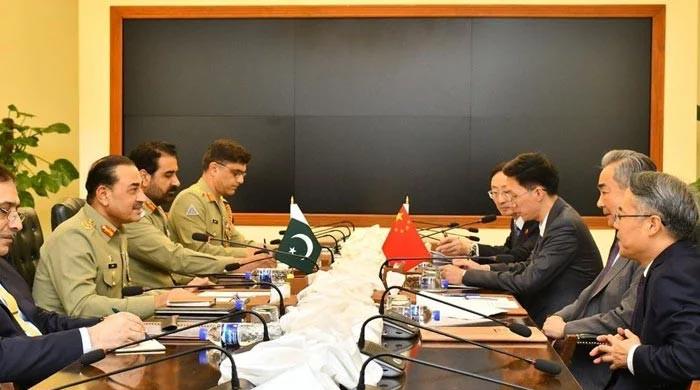 |
| Chief of Army Staff Field Marshal Asim Munir (left) in a meeting with Chinese Foreign Minister Wang Yi on August 22, 2025. — Facebook@ISPROfficial1 |
China Hails Pakistan Army as Pillar of Stability: Strengthening Pakistan–China Friendship and CPEC Security
Chief of Army Staff Field Marshal Asim Munir in a meeting with Chinese Foreign Minister Wang Yi on August 22, 2025. — Facebook@ISPROfficial1 China has lauded the Pakistani military as a key force for national stability and a strong guardian of the China–Pakistan friendship,...
When Chinese Foreign Minister Wang Yi met with Pakistan’s Chief of Army Staff, Field Marshal Syed Asim Munir, in Islamabad on August 21, it wasn’t merely a diplomatic formality—it was a moment of global signaling. In an official statement, Beijing described the Pakistan Army as a “pillar of national stability” and a “strong guardian of Pakistan–China friendship.” At a time when international tensions swirl, Wang underscored that China continues to prioritise Pakistan in its neighborhood diplomacy. These words reflect more than alliance—they echo the resilience of a bond rooted in shared history, shared ideals, and shared destiny. The News International
On the ground in Rawalpindi, Field Marshal Munir echoed that sentiment. Referring to China as Pakistan’s "iron brother" and their partnership as “as solid as a rock,” he emphasized a deep-rooted strategic friendship—supported not just by military commanders, but by people across both nations. The News InternationalApp
This moment of mutual recognition comes amid a complex global landscape—rising geopolitical rivalries, security threats, and regional instability. Even under such pressures, the Pakistan–China partnership stands firm. President Xi and Prime Minister Shehbaz Sharif, along with Foreign Minister Wang Yi and COAS Munir, affirm that their connection transcends shifting international winds. In Beijing’s vision, Pakistan remains a constant—a partner anchored in mutual trust and purpose. ReutersThe Nation
This alliance is not symbolic—it’s active. From joint military training to shared defense projects, arms development, and cross-border exercises with the PLA, Pakistani and Chinese forces remain commons in building regional defense. WikipediaPakistan Today Importantly, the Pakistan Army also leads key security operations: protecting Chinese nationals and projects linked to the China–Pakistan Economic Corridor (CPEC). In a testament to that role, the army swiftly neutralized threats during a recent Gwadar hotel attack, ensuring the safety of Chinese personnel. The News InternationalBusiness Standard
This isn’t just military might—it’s a message of reassurance. As global uncertainties swirl, Beijing values regional stability, and Pakistan’s armed forces serve as the cornerstone. Addressing national security, COAS Munir assured that protective measures for Chinese projects and institutions remain a priority. The News InternationalApp
In broader terms, this moment cements two decades of growing bilateral trust. From negotiations under the Pakistan–China Joint Consultative Mechanism to security frameworks underpinning CPEC, both countries have built infrastructure—physical and strategic—to withstand political storms. Wikipedia+1 Military victories lie not just in defense but in shared confidence, coordination, and purpose.
This partnership is also a reminder of values. The Chinese minister’s acknowledgment of the Pakistan Army’s role didn’t neglect humanitarian dimension—it paid tribute to the military’s sacrifices in combating terrorism and protecting civilian lives. AppPakistan Today After all, ensuring national stability isn’t just about borders—it’s about communities, businesses, and citizens at peace.
As a narrative, this transcends statecraft. It’s about two nations saying: we stand stronger, together. It’s about families in remote valleys knowing their future rests not on shifting alliances, but on partnerships that endure. And perhaps, most powerfully, it reminds us that stability is a shared choice—by leaders, institutions, and citizens alike.
On the ground in Rawalpindi, Field Marshal Munir echoed that sentiment. Referring to China as Pakistan’s "iron brother" and their partnership as “as solid as a rock,” he emphasized a deep-rooted strategic friendship—supported not just by military commanders, but by people across both nations. The News InternationalApp
This moment of mutual recognition comes amid a complex global landscape—rising geopolitical rivalries, security threats, and regional instability. Even under such pressures, the Pakistan–China partnership stands firm. President Xi and Prime Minister Shehbaz Sharif, along with Foreign Minister Wang Yi and COAS Munir, affirm that their connection transcends shifting international winds. In Beijing’s vision, Pakistan remains a constant—a partner anchored in mutual trust and purpose. ReutersThe Nation
This alliance is not symbolic—it’s active. From joint military training to shared defense projects, arms development, and cross-border exercises with the PLA, Pakistani and Chinese forces remain commons in building regional defense. WikipediaPakistan Today Importantly, the Pakistan Army also leads key security operations: protecting Chinese nationals and projects linked to the China–Pakistan Economic Corridor (CPEC). In a testament to that role, the army swiftly neutralized threats during a recent Gwadar hotel attack, ensuring the safety of Chinese personnel. The News InternationalBusiness Standard
This isn’t just military might—it’s a message of reassurance. As global uncertainties swirl, Beijing values regional stability, and Pakistan’s armed forces serve as the cornerstone. Addressing national security, COAS Munir assured that protective measures for Chinese projects and institutions remain a priority. The News InternationalApp
In broader terms, this moment cements two decades of growing bilateral trust. From negotiations under the Pakistan–China Joint Consultative Mechanism to security frameworks underpinning CPEC, both countries have built infrastructure—physical and strategic—to withstand political storms. Wikipedia+1 Military victories lie not just in defense but in shared confidence, coordination, and purpose.
This partnership is also a reminder of values. The Chinese minister’s acknowledgment of the Pakistan Army’s role didn’t neglect humanitarian dimension—it paid tribute to the military’s sacrifices in combating terrorism and protecting civilian lives. AppPakistan Today After all, ensuring national stability isn’t just about borders—it’s about communities, businesses, and citizens at peace.
As a narrative, this transcends statecraft. It’s about two nations saying: we stand stronger, together. It’s about families in remote valleys knowing their future rests not on shifting alliances, but on partnerships that endure. And perhaps, most powerfully, it reminds us that stability is a shared choice—by leaders, institutions, and citizens alike.
Tags
National
